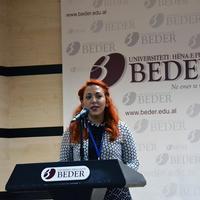Ilda Poshi
BEDER University, English Language and Literature, Faculty Member
In this paper we will deal with the concept of the monstrous acts and the importance of parental responsibility in the novel Frankenstein. It is highlighted that it is easier to understand the reasons behind some “crimes” when the family... more
In this paper we will deal with the concept of the monstrous acts and the importance of parental responsibility in the novel Frankenstein. It is highlighted that it is easier to understand the reasons behind some “crimes” when the family relationships are analysed thoroughly. In the novel Frankenstein, there are some certain types of family relationships and under the shadow of these relationships, the relationship between father-like scientist and his creation is held successfully. By analysing some monstrous acts in the light on the flaws of parent-child relationship, we endeavour at demonstrating that Mary Shelley’s Frankenstein is not a simple retelling of a monster fabricated by a disturbed mind. This way, the novel represents a cross between the influence of parents’ role in a child’s life and the degradation of Enlightenment ideas according to which only science and logic can reveal human “truths”, whereas Romanticism worked as a medium to veil or hinder personal fulfilment. Finally, this paper helps us see the real “monster” in our lives and parental responsibilities nowadays socially and historically, where Enlightenment ideologies and concerns such as intellectualism or humanism are still a groove of heightened debate.
Research Interests:
Prior to being accepted as a real and systematic discipline translation has been lengthily considered a multi-sided driving force used to enable multi-cultural/linguistic communication. As experience shows, translation was born as a... more
Prior to being accepted as a real and systematic discipline translation has been lengthily considered a multi-sided driving force used to enable multi-cultural/linguistic communication. As experience shows, translation was born as a practical endeavour to convey social, historical and cultural disparities between countries and only in the 1960s, thanks to Holmes, it was recognised as a solid discipline inexorably intertwined with other disciplines. Moreover, and above all, translation is not just science, it is not a mere process of decoding the encoded – it is an art. Such categorisation is what made Otokar Fischer and other scholars faithfully promote translation as an interface between science and art. This is what this research will try to encompass. We will see how in literary translation, the art of translating marries the theory so that to explain the uniqueness of this discipline. In addition, we will see the concept of literariness as an element of paramount importance in literary translation and especially in poetry, the most sublime aka most problematic genre of literature. As P.B Shelley confesses in A Defence of Poetry: " Poetry ... awakens and enlarges the mind itself by rendering it the receptacle of a thousand unapprehended combinations of thought. Poetry lifts the veil from the hidden beauty of the world, and makes familiar objects be as if they were not familiar; it reproduces all that it represents, and the impersonations clothed in its Elysian light stand thenceforward in the minds of those who have once contemplated them, as memorials of that gentle and exalted content which extends itself over all thoughts and actions with which it coexists. (P.B. Shelley, 1904, 33) Dynamic equivalence is the key to achieve the explanation of complex phenomena through simpler phenomena happening in literary translation and especially in poetry. Through an inductive-descriptive method we aim at bringing light to how and to what extent literariness can be translated by analysing coram Allen Ginsberg's Howl and its translation in Albanian Kujë by Ukë Zenel Buçpapaj. This way we will see the essential and irreplaceable niche literariness occupies in poetry translation.
